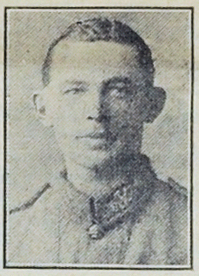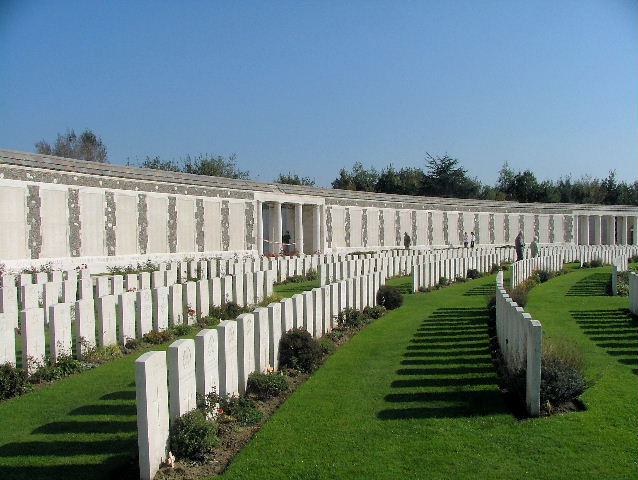Name
John (Jack) E Welch (MM)
Conflict
First World War
Date of Death / Age
26/09/1917
21
Rank, Service Number & Service Details
Corporal
265532
Hertfordshire Regiment
Awards: Service Medals/Honour Awards
1914 (Mons) Star, British War and Victory Medals
Military Medal
Cemetery/Memorial: Name/Reference/Country
TYNE COT MEMORIAL
Panel 153.
Belgium
Headstone Inscription
NA
UK & Other Memorials
Hitchin Town Memorial,
4 Co' Hertfordshire Reg' Territorials’ Memorial, Hitchin,
Town Hall Memorial, Hitchin,
St Mary's Church Roll of Honour (Book), Hitchin,
Hertfordshire Regimental Memorial, All Saints Church, Hertford
Pre War
His parents were Mr and Mrs F. Welch of 1 Hill View, St. Andrew's St. Hitchin. He had been born in Hitchin.
Before joining the army he had been employed by Woodworkers Ltd of Letchworth.
Wartime Service
On being mobilised was in No. 13 Platoon of No. 4 Company of the Hertfordshire Regiment Territorial Force with the Regimental Number 265532. He was a stretcher-bearer and was killed in action in Belgium.
His award was the result of bravery in the field and was probably awarded in November 1916 as at that time he wrote home to say that the award had been made. The incident was almost certainly during the Battle of the Ancre in November 1916. Colonel J.A. Rose, Officer Commanding the Hitchin Signal Depot, Royal Engineers, presented the Military Medal to Jack's mother in 1918.
His notebook and other records give some indication of his army service. He landed in France on the 5th November 1914 along with the rest of the Hertfordshire Regiment, which on the 20th November 1914, was made part of the 4th (Guards) Brigade in the 2nd Division. Such was their service with this famous Brigade that they called themselves the ‘Herts Guards’.
He went on leave on the 10th December 1915, no doubt having been engaged in helping the many casualties from the violent fighting of that year. In February 1916 the Hertfordshires were transferred to the 118th Brigade of the 39th Division which was part of III Corps in the 1st Army. April 24th 1916 found him at Festubert and his second leave commenced on the 3rd May 1916. Shortly after his return, on the 18th May 1916, the Hertfordshires were at Givinchy (Givenchy). A succession of moves followed. Souchez on the June 12th 1916, Rue de Vintage (Riez-du-Vinage) on the 24th July, Locon on the 29th June, Hingette (Hinges) on the 10th July, Festubert 26th July and Bethune on the 4th August. All punctuated with spells in the front line but no major actions.
On the 20th August 1916 he arrived at Guesterville (Guestreville) in the Somme District and on the 28th August he went by bus to Mailly Maillet arriving on the 2nd September. He noted being at Ingelbalmere (Engelbelmer) on the 9th September and at Knightsbridge on the 25th September 1916. The 12th October 1916 found him at Martinsaake (Martinsart) and on the 24th October he arrived at Lenlis (Senlis-le-Sec).
On the 12th November 1916 he was in Thiepval ready for the Battle of the Ancre which commenced the next day. The advance began on the 13th November with No. 4 Company on the extreme right of the 118th Brigade. No. 4 Company worked steadily forward up the Hansa Line killing and wounding many of the enemy in the process. He arrived in Beaumont Hamel that day and on the night of the 14th/15th November the Battalion was relieved after relatively few casualties by the standards of those days. Out of the Battalion of approximately 800 fighting men they had lost 7 officers and 150 other ranks. The survivors marched to a hutted camp near Aveluy where they arrived on the 16th November having given very good account of themselves as part of a well-organised plan.
On the 18th November 1916 they retired to Doullons, on to Caudas on the 21st November and to Wormout (Wormhout) on the 28th November, arriving at Ypres on the 23rd December. They stayed in Ypres for the first three months of 1917 in and out of the front line, both engaging in and repelling trench raids. April 22nd found him in Vandhouke (? Brandhoek) and at the Boulounge (Boulogne) Rest Camp on the 3rd June 1917. Later in the month he attended the 2nd Army School of Musketry and he was resting on the 1st and 25th July. On the 27th July he was at the YRB Canal and at Ypres on the 30th July 1917.
The Hertfordshires were involved in their most devastating action from all points of view on the 31st July and 1st August 1917 in the Battle of St. Julien. The Battalion crossed the Steenbeek stream with difficulty, but the supporting tanks were bogged down and the expected creeping barrage failed to materialise as the guns could not be moved forward in the deep mud. Over half the Battalion was killed or wounded during those two dreadful days and for a time the Padre was the only officer left to command the Battalion. The Hertfordshires temporarily ceased to exist as a fighting unit. One of the casualties was Jack though he does not seem to have been seriously injured as he was only in hospital from the 1st to the 3rd August and re-joined the Battalion on the 5th August 1917. He was given his last leave on the 19th August 1917.
There is a slight discrepancy in the records concerning the date of his death. Family records show it as the 24th September 1917 but the Commonwealth War Graves Commission and the ‘Soldiers died’ database shows it as the 26th September 1917. The Herts were not engaged in any major action on either date, but there was a steady attrition whenever units took their place in the line, quite apart from the constant shelling and sniping which went on round the clock in most of the forward areas. His notebook records the names of several men who were killed and wounded. A comrade wrote home and said that everything possible was done for him but his wounds proved fatal. This suggests that he died of wounds in a forward area as his body was not found at the end of the war.
He has no known grave, but is remembered on the Tyne Cot Memorial to the Missing at Passchendaele in Belgium.
Additional Information
Jack is mentioned in a very thorough biography for Jack Alfred Willmott by Paul Johnson, which appears in the HAW Archive HERE
Acknowledgments
Adrian Dunne, David C Baines, Jonty Wild



